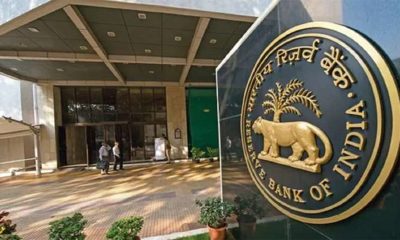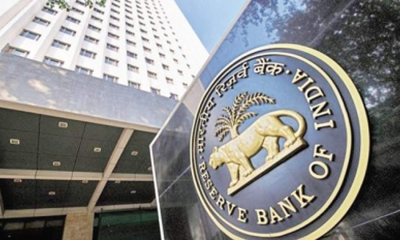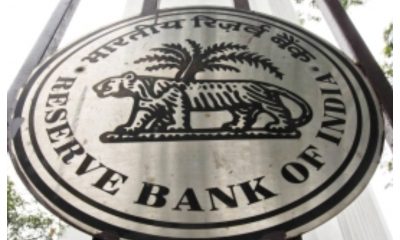Business
RBI’s monetary policy meet: Here’s some of the expectations
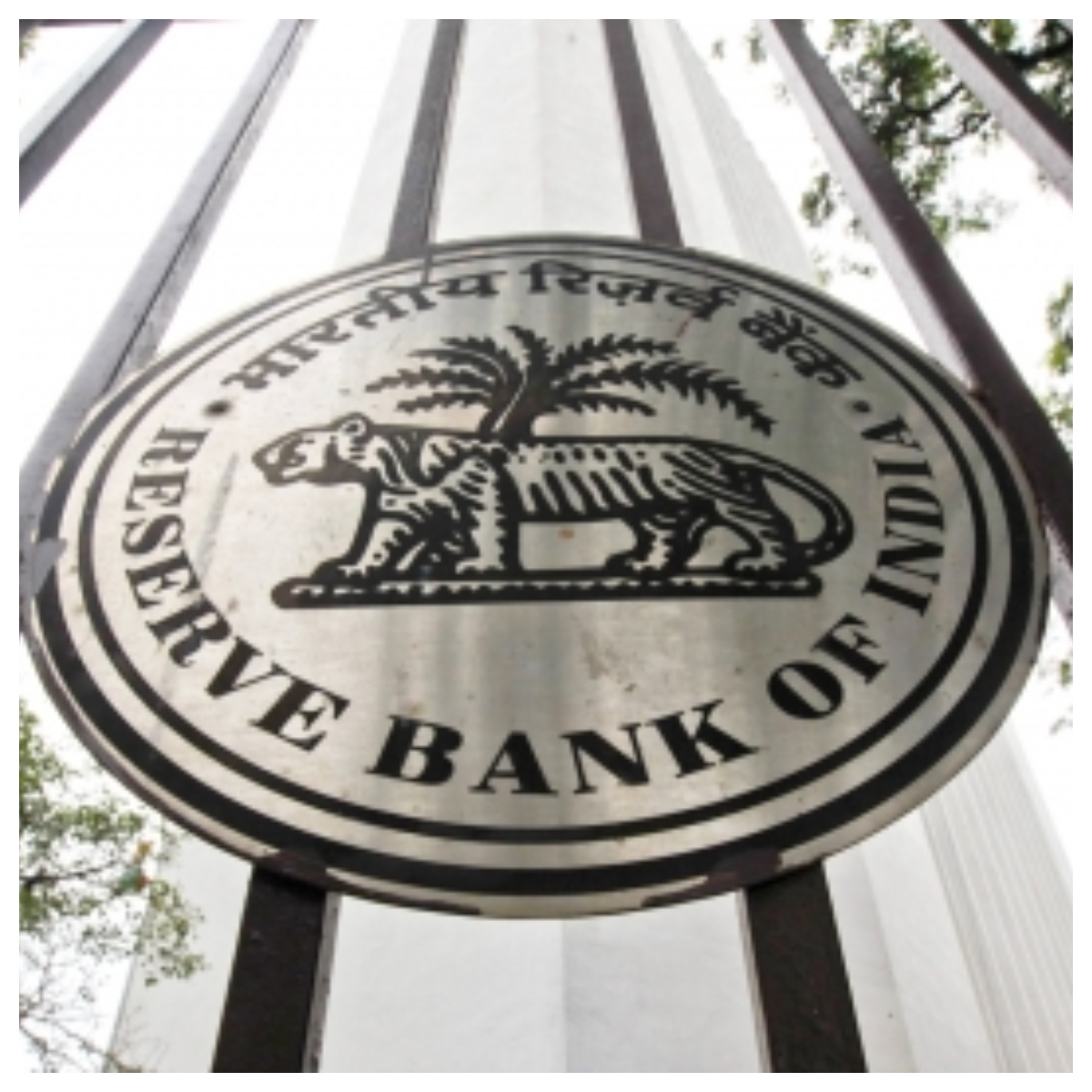
Though the RBI’s raising policy rates in the ongoing monetary policy committee meeting is a “no-brainer”, as its Governor Shaktikanta Das said in a recent interview, investors, however, await the actual degree of percentage hike before taking fresh positions and future course of action in the financial markets.
Besides policy rates, investors also eye other macro-economic forward-looking guidance from the central bank.
The three-day meeting started on Monday.
In early May, the RBI, in a surprise off-cycle meeting, hiked the repo rate, the rate at which the central bank lends short-term funds to banks by 40 basis points (bps) to 4.40 per cent, amidst rising inflation concerns in the economy.
In the same off-cycle meeting, the cash reserve ratio was hiked by 50 basis points to 4.5 per cent essentially to squeeze out some liquidity from the system.
India’s retail inflation accelerated to 7.79 per cent in April, remaining above the tolerance limit of the central bank for a fourth month in a row. It is highly likely that the retail inflation will remain above 6 per cent for another few months.
Besides, wholesale inflation in the country rose to 15.08 per cent in April 2022 from 14.55 percent in March, which has been in double digit for over a year now.
Below are some of the expectations by analysts, market observers, and real estate players on the possible outcome of the ongoing monetary policy meeting:
Deepak Jasani, Head of Retail Research at HDFC Securities
MPC’s off-cycle policy meeting in May clearly pivoted its focus on inflation over growth as a policy priority. The MPC is likely to increase the benchmark repo rate in its ongoing monetary policy review as inflation shows no signs of abatement.
The RBI is likely to follow a nuanced and calibrated approach to rate hikes once it reaches its pre-Covid neutral accommodation (5.15 per cent vs current 4.40 per cent). We expect a 40 basis points rate hike in the upcoming policy meet and see the RBI raising policy rates to 5.15 per cent by calendar year end.
Any further rate hikes will be contingent on the inflation-growth dynamics and would be data dependent.
Hence, equity markets and debt markets have for the most part discounted this rate hike and market reaction would depend more on the statement of the RBI Governor hinting about the future course of action.
Ashish Chaturmohta, Director, Research Group at JM Financial Services
India is currently facing the heat of “imported inflation” owing to rising crude prices, supply chain disruption and global liquidity absorption.
Hence, to control the same, the government has played its role by reducing petrol and diesel prices, bringing in restrictions for exports in order to keep the domestic market stable etc, and on the other hand, the RBI has been very proactive in their actions, which was clearly visible from their 40 base points surprise rate hike.
It’s been the first time in the last several years that the RBI and the Government are both working in a synchronised way. We believe the rate hike would be 30-40 basis points along with a stable outlook on the GDP.
Mohit Batra, Founder and CEO of MarketsMojo
The RBI will try to tackle two issues in its upcoming monetary policy – tackle inflation and ensure that the rupee does not depreciate too much against the dollar. The last time when the RBI revised its inflation target, crude was at $100 per barrel, and now it’s trading at $120 per barrel, suggesting a risk of inflation flaring up is high.
Keeping these facts like rupee depreciation and high inflation rate, I expect RBI to hike the interest rate by 50 basis points.
Satish Kumar, Research Analyst at Choice Broking
We are estimating a repo rate hike of 40 basis points by the central bank in the coming monetary policy to contain the inflation which rose to 8-year high of 7.8 per cent in April. Upside risks to inflation remain elevated given the prevailing high crude oil and commodity prices amidst supply side concerns.
Pushpender Singh, MD of JMS Group
The outcome of the MPC meeting is pretty obvious, most probably leading to an inevitable hike in the repo rate in lieu of a concerted effort to lower the inflation rates, which perhaps is becoming a huge aberrant in the growth parameters of the economy. I do not expect to see a massive increase in the repo rate but definitely, a slight rise will be announced to curb the dwindles and shift the radar of growth in the right direction.
Aman Sharma, Director at Spaze Group
There are great chances of a repo rate hike yet again in a bid to control the inflationary rates that grow unabated despite direct attempts to stop it. It has to be accepted with a pinch of salt by the industries across the segments which will face teething troubles due to the probable hike after the RBI’s MPC meeting.
A surge in the repo rate is almost certain, I do not think there will be a sharp insurgence but somewhat a marginal increase to let the inflationary challenges deflate and the numbers drop.
Mohit Nigam, Head, PMS, Hem Securities
The repo rate is anticipated to be raised by another 40-50 basis points by the MPC. This decision is influenced by rising price levels as a result of ongoing geopolitical tensions and supply-chain pressures, which are driving inflation higher. The primary goal of the RBI would be to keep inflation under control and minimise its second-round impacts.
Inflationary pressures on food and fuel remain high, and supply-chain disruptions continue to put upward pressure on input costs. The biggest issue is that if rates are raised further, urban demand, which was formerly a major concern, may dwindle. Agricultural output will be supported by favourable weather conditions, thus rural demand may not be affected as much.
Ashish Khandelia, Founder of Certus Capital
We expect the repo increase to be between 40-50 basis points in upcoming MPC meeting with future increases leading to 5.75 per cent (where we were exactly 3 years ago) or upwards by the end of FY23. 40 basis points increase in May caused homes loans to move in to 7 per cent +/- range from 6.5 per cent earlier.
And by the end of this financial year, home loan rates will likely touch 8 per cent. This is unlikely to derail the housing momentum, but it will certainly soften it. Coupled with increasing prices, the growth may slow down a bit in FY23, after a record FY22.
Business
Centre releases over Rs 260 crore for rural local bodies in Kerala

New Delhi, Dec 15: The government on Monday said it has released Rs 260.20 crore to rural local bodies in Kerala as part of the 15th Finance Commission grants for the financial year 2025-26.
The amount represents the first instalment of untied grants and covers all 14 district panchayats, 152 block panchayats and 9,414 gram panchayats (GPs) in the state, according to an official statement.
Untied grants are meant to be utilised by rural local bodies/PRIs for location-specific felt needs under the 29 subjects listed in the Eleventh Schedule of the Constitution, except for salaries and other establishment expenditures.
Tied Grants, on the other hand, are earmarked for basic services relating to sanitation and maintenance of ODF (open defecation-free) status, including management and treatment of household waste, human excreta and faecal sludge, and supply of drinking water, rainwater harvesting, and water recycling.
Last week, the government released Rs 717.17 crore to strengthen rural local bodies in Maharashtra as part of the first instalment of untied grants for the financial year 2025-26. The funds were released to duly elected and eligible rural local bodies in the state, covering two district panchayats (Zilla Parishads), 15 block panchayats (panchayat samitis), and 26,544 gram panchayats.
The government, through the Ministry of Panchayati Raj and the Ministry of Jal Shakti (Department of Drinking Water and Sanitation), recommends release of 15th Finance Commission grants to states for Panchayati Raj Institutions, which are then released by the Ministry of Finance.
The allocated grants are recommended and released in two instalments in a financial year.
Earlier in November this year, the Centre released over Rs 223 crore for rural local bodies in Assam and another Rs 444.38 crore to strengthen panchayat bodies in Odisha as part of the 15th Finance Commission grants.
Business
PM Modi’s 3-nation visit to further bolster trade and investment ties
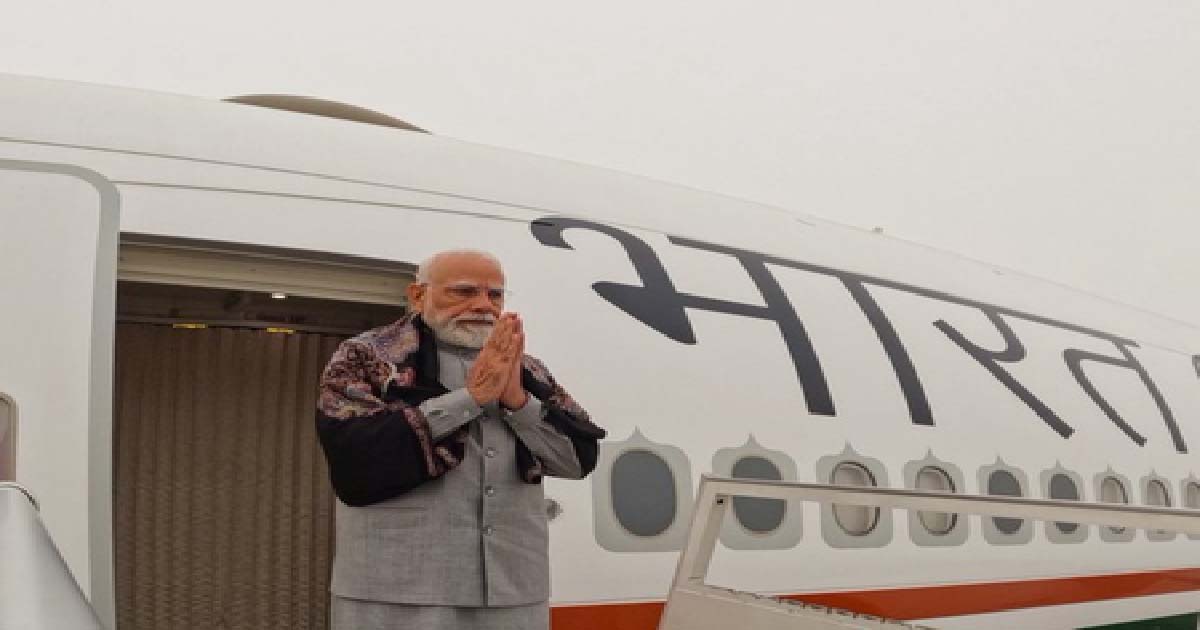
New Delhi, Dec 15: As Prime Minister Narendra Modi embarked on a three-nation visit to Jordan, Ethiopia and Oman on Monday, bolstering economic and trade ties is among the key agenda items of his visit.
PM Modi’s visit is expected to open far-reaching opportunities to enhance the country’s economic footprint across West Asia and Africa.
Last week, the Union Cabinet, chaired by the Prime Minister, approved the proposed Free Trade Agreement (FTA) between India and Oman, aimed at deepening trade and investment relations between the two countries.
The approval also came after Oman’s Shura Council approved the Gulf nation’s proposed FTA with India. The talks for the trade agreement, officially termed the Comprehensive Economic Partnership Agreement (CEPA), formally began in November 2023.
India and Oman share a long-standing and multidimensional Strategic Partnership supported by strong trade ties, energy cooperation and cultural linkages. The economic and commercial relations between India and Oman are robust and buoyant.
The bilateral trade between the two nations reached $8.947 billion during FY 2023-2024, and for FY 2024-25, it stood at $10.613 billion, according to an official statement. Bilateral investment flows have also been strong, as reflected in numerous joint ventures established both in India and Oman.
Moreover, there are over 6,000 India-Oman joint ventures present in Oman, estimated to be adding $7.5 billion to Oman’s economy in the form of total capital investment over a long period.
PM Modi will hold high-level talks with the Sultan of Oman in Muscat and discuss strengthening the Strategic Partnership as well as the strong commercial and economic relationship between the two nations.
Notably, India is Jordan’s third-largest partner, with bilateral trade at around $2.8 billion. Jordan is a key supplier of fertilisers to India, particularly phosphates and potash.
Although the size of India-Ethiopia bilateral trade was around $550 million in FY25, India was the second largest trading partner for the African nation. India’s key exports include primary and semi-finished iron and steel products, drugs and pharmaceuticals, fertilisers and machinery, among others.
Business
Indian stock market ends in bullish tone over hopes of renewed FII inflows

Mumbai, Dec 13: Indian equity benchmarks made marginal losses during the week amid sustained FII outflows and uncertainty surrounding the US-India trade negotiations.
However, the market ended the week in a bullish tone with Nifty surging 0.57 per cent on the last trading day after the US Federal Reserve announced a 25-bps rate cut.
Benchmark indices Nifty and Sensex dipped 0.36 and 0.17 per cent during the week to close at 26,046 and 85,267, respectively.
Indian equities opened the week on a subdued note, amid continued rupee depreciation and negative global cues due to rising Japanese bond yields.
The US Fed rate cut later in the week eased liquidity concerns and fuelled hopes of renewed FII inflows. With supportive central bank policies, steady domestic investments, and optimism over trade progress despite unclear timelines, benchmarks closed the week on a strong note.
India’s year-on-year inflation rate based on the Consumer Price Index (CPI) was estimated at 0.71 per cent for November this year which was marginally higher than the 0.25 per cent in October, according to figures released by the Ministry of Statistics.
Broader indices underperformed, with the Nifty Midcap100 and Smallcap100 down 0.51 per cent and 0.67 per cent, respectively, in a week.
Sectoral performance was mixed, with IT under pressure while PSU banks, real estate and consumer durables witnessed selective buying.
Hrishikesh Yedve, AVP Technical and Derivative Research, Asit C. Mehta Investment Interrmediates, said that Nifty’s weekly chart shows buying interest at lower levels.
Nifty has 26,200 and 26,325 as stiff resistance levels while 25,700 will act as support zone, he added.
Analysts said that markets will likely remain positive in near future but sensitive to rupee stability, FII flow trends, trade agreement clarity, and cues from major central banks abroad.
Amidst risks from currency fluctuations and global trade uncertainties, improving earnings visibility and liquidity support provide a constructive backdrop and downside protection, they added.
-

 Crime3 years ago
Crime3 years agoClass 10 student jumps to death in Jaipur
-

 Maharashtra1 year ago
Maharashtra1 year agoMumbai Local Train Update: Central Railway’s New Timetable Comes Into Effect; Check Full List Of Revised Timings & Stations
-

 Maharashtra1 year ago
Maharashtra1 year agoMumbai To Go Toll-Free Tonight! Maharashtra Govt Announces Complete Toll Waiver For Light Motor Vehicles At All 5 Entry Points Of City
-

 Maharashtra1 year ago
Maharashtra1 year agoFalse photo of Imtiaz Jaleel’s rally, exposing the fooling conspiracy
-

 National News1 year ago
National News1 year agoMinistry of Railways rolls out Special Drive 4.0 with focus on digitisation, cleanliness, inclusiveness and grievance redressal
-

 Maharashtra1 year ago
Maharashtra1 year agoMaharashtra Elections 2024: Mumbai Metro & BEST Services Extended Till Midnight On Voting Day
-

 National News1 year ago
National News1 year agoJ&K: 4 Jawans Killed, 28 Injured After Bus Carrying BSF Personnel For Poll Duty Falls Into Gorge In Budgam; Terrifying Visuals Surface
-

 Crime1 year ago
Crime1 year agoBaba Siddique Murder: Mumbai Police Unable To Get Lawrence Bishnoi Custody Due To Home Ministry Order, Says Report



